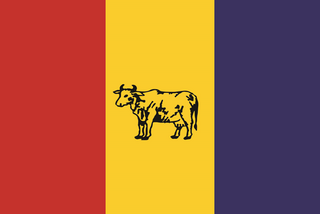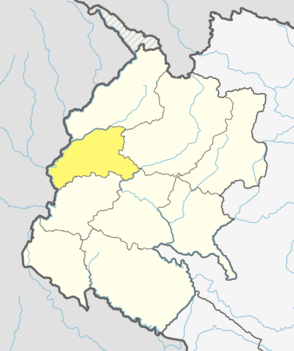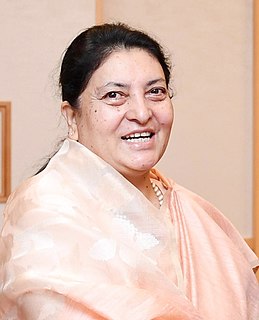Related Research Articles
Lokendra Bahadur Chand was the 27th prime minister of Nepal four times: from 1983 to 1986, briefly during April 1990, briefly during 1997, and from October 2002 until June 2003. He is also involved in literature and have won madan puraskar for his book Bisarjan in 2054 B.S.

The Rastriya Prajatantra Party [Nepali pronunciation: [rasʈrijʌ prʌˈd͡zatʌntrʌ ˈpa(r)ʈi]) is a constitutional monarchist and Hindu nationalist political party in Nepal. It was formed by former prime ministers Surya Bahadur Thapa and Lokendra Bahadur Chand, who served two terms each as prime minister since the end of the Rastriya Panchayat.

Rashtriya Prajatantra Party-Chand was a Nepalese political party. It was a right-wing pro-monarchy party, formed out of the political elite of the erstwhile Panchayat system.

Baitadi District, historical name “Bairath” (बैराथ), a part of Sudurpashchim Province, is one of the 77 districts of Nepal. It is a Hill district. Baitadi, with Dasharathchand as its headquarters, covers an area of 1,519 km2 (586 sq mi) and has a population of 250,898 according to the census (2011). The Baitadi district entails 56 village development councils (VDCs) and two municipality in the past. Now, by federal policy there are 10 local units; 4 Municipalities and 6 Rural Municipalities. Baitadi falls into the farthest western regional district of Nepal touching Jhulaghat, India, Nepal's neighboring country, to its border.
Hariyali Nepal Party is a political party in Nepal. The party is registered with the Election Commission of Nepal ahead of the 2008 Constituent Assembly election. It was established in 1997 and is a member of the Global Greens and the Asia-Pacific Green Network.
Rastriya Bikas Party is a political party in Nepal, formed by elements of the erstwhile panchayat system. The party chair, Dr. Asarphi Shah, was appointed assistant minister for local development, in 2002. The party took part in the 2006 municipal polls. The party is registered with the Election Commission of Nepal ahead of the 2008 Constituent Assembly election.

Cricket Association of Nepal (CAN) is the official governing body of cricket in Nepal. It was suspended from 2016 to 13 October 2019 due to governmental interference. The ICC welcomed the elections of the board held in September 2019 and formally reinstated the board on a conditional basis on 14 October. Its headquarters is in Kathmandu, Nepal. Cricket Association of Nepal is Nepal's representative at the International Cricket Council (ICC) and remains an associate member, having been a member since 1988 AD. It is also a member of the Asian Cricket Council (ACC).

The Communist Party of Nepal , abbreviated CPN (RM), is a communist party in Nepal. It was founded on June 2012 by the then vice-chairman of Unified Communist Party of Nepal (Maoist), Mohan Baidya after splitting from the party.

Dasharath Chand is martyr of Nepalese Democratic Movement and a politician of Nepal who was active in starting a political revolution in Nepal during Rana rule. He was born at Baskot of Baitadi district of Nepal in 1903 AD as a son of Sher Bahadur Chand.

Kamal Thapa is a Nepalese politician belonging to Rastriya Prajatantra Party. Thapa, who served as a Deputy Prime Minister and Federal Affairs and Local Development. Thapa is also immediate past president of Nepal's royalist party, the Rastriya Prajatantra Party.

Rohit Chand Thakuri is a Nepalese professional footballer who plays as a midfielder for Liga 1 club Persija Jakarta and the Nepal national team. During his teenage years, Chand was heavily linked to clubs such as Arsenal, Tottenham, and Lille. Chand was awarded The Best Player of The Year in Liga 1 2018 as well as becoming champion with Persija Jakarta.

The Nepal Praja Parishad was the first attempt to form an organization to lead the revolution against the Rana dynasty in Nepal. Led by Tanka Prasad Acharya, the group was founded in 1936, and is seen as the first political party in Nepal. The organisation collapsed after their plot to assassinate multiple members of the Rana regime was discovered, and some of its key members were executed.

The Communist Party of Nepal is a political party in Nepal founded in April 2013. The party was formed through the merger of Communist Party of Nepal (Unified), Communist Party of Nepal Marxist−Leninist (Samajbadi), Communist Party of Nepal, Marxist Communist Party of Nepal, Bidrohi ML and the Independent Thought Group. Rishi Kattel is the chairman of the party. Jagat Bahadur Bogati and Lok Narayan Subedi serve as co-chairs of the party, whilst Haridev Gyawali, Ram Bahadur Bhandari and Tanka Rai serve as vice-chairs.
Nar Bahadur Chand is a member of 2nd Nepalese Constituent Assembly. He won Baitadi–2 seat in CA assembly, 2013 from Nepali Congress.

Bidya Devi Bhandari is a Nepalese politician who is the second and current president of Nepal.

The 2017 Nepalese local elections were held in Nepal in three phases on 14 May, 28 June and 18 September in 6 metropolitan cities, 11 sub-metropolitan cities, 276 municipalities and 460 rural municipalities. It was the first local level election to be held since the promulgation of the 2015 constitution.

Communism in Nepal traces its roots back to the pro-democracy movement of 1951, and the subsequent overthrow of the autocratic Rana regime and the establishment of democracy in Nepal. The communist movement in Nepal has split into factions multiple times and multiple factions have come together into a single fold at times as well. It has a history of getting banned from open political discourse; as well as multiple instances of embracing guerrilla insurgency, most notably, the Maoist insurgency in the 1990s and early 2000s that led to the Nepalese Civil War, claiming at least 17,000 lives. After the Maoists and other main political parties formed a united coalition, launching a successful peaceful civil resistance against the dictatorial coup d'état by the monarchy, which resulted in the abolition of the monarchy and drafting of a new constitution affirming Nepal as a secular, federal, democratic republic striving towards democratic socialism, the two main communist parties of Nepal contested the first election according to the new constitution as a coalition, eventually leading to the unification of two parties with a strong majority in the federal parliament as well as six out of seven provinces of Nepal.
References
- ↑ Election Commission of Nepal Archived October 12, 2006, at the Wayback Machine
- ↑ The Rising Nepal Archived 2007-07-26 at archive.today